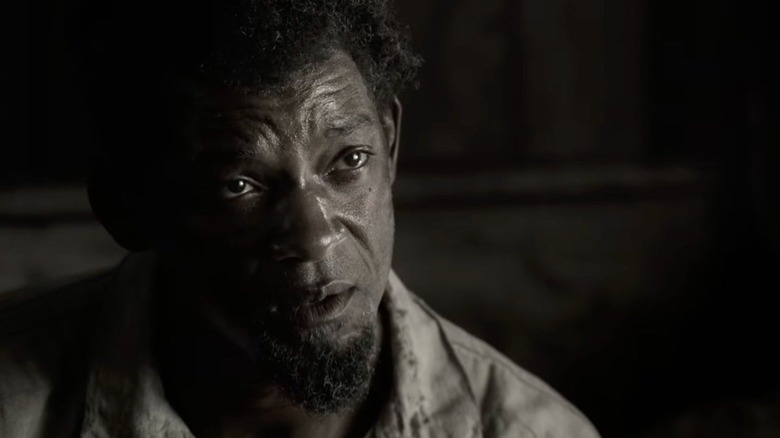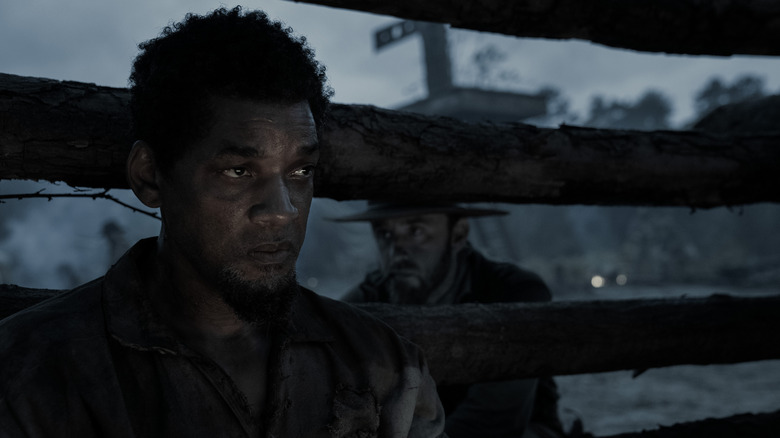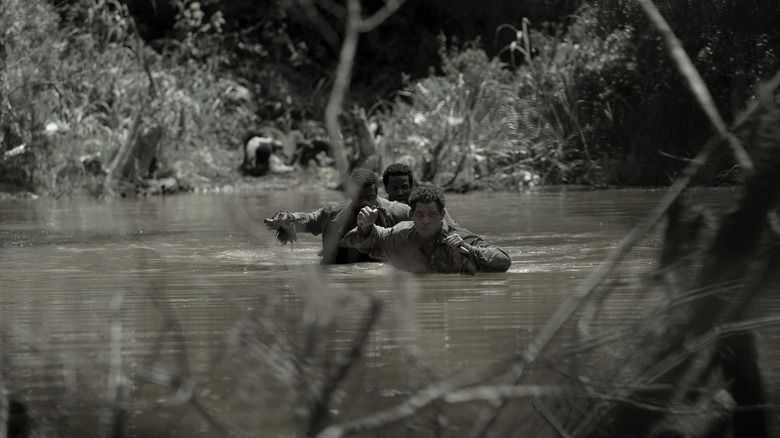Emancipation Review: Will Smith's New Drama Has An Identity Crisis
Nearly every film directed by Antoine Fuqua feels like it should have been released in 1996. His popcorn sensibilities and penchant for hard-edged, muscular action all come from a time where R-rated, adult oriented genre fare made at a mid-sized budget could get a lot of people to head out to the theater. The man only made one movie that was released in the 1990s, the Chow Yun-fat starring "The Replacement Killers," but spiritually, films like "Shooter," "Olympus Has Fallen," and "Southpaw" belong there. His latest feature, "Emancipation," seems like it would be a swerve away from his typical brand of old school, high-octane thrills, but even though this is a film that contends with the horrors of slavery, this is still every bit an Antoine Fuqua picture, for better and worse.
Anyone with a knowledge of American history is likely familiar with the image of "Whipped Peter," a Black man whose back was horrifically scarred as a result of brutal lashings while he was a slave. This photograph served as a rallying cry in the fight for abolition, but Antoine Fuqua's film is not particularly interested in the impact or legacy of that harrowing picture. While the movie attempts to have the veneer of emotional historical drama, "Emancipation" ends up making Peter into an action hero at the center of an on-the-run chase movie with Will Smith as the lead.
In this telling of the story, Peter has been sold off to the Confederate Army, separating him from his wife Dodienne (Charmaine Bingwa) and children. Upon hearing word of Abraham Lincoln's Emancipation Proclamation and Union troops making camp in Baton Rouge, Peter decides to escape in the hopes that the army will help reunite him with his family. However, he has a ruthless, sadistic slave catcher (Ben Foster) on his tail, and he sees the God-fearing Peter as ripe fodder for his own God complex. The two men set off into the swamps of Louisiana in a cat-and-mouse chase that will end in freedom or death.
The push and pull of spectacle
Tension in a thriller is an odd thing, because it straddles the line between the terrifying and the exciting. You are on the edge of your seat because you don't want something bad to happen to your main character, but also because you can't wait to see what happens next. In telling a story about the utter terror of slavery, that can be a dangerous line to walk, especially if the film you are making has the primary Black character as someone trying to avoid violence and not actively turning the tables on their white oppressors. In "Emancipation," much of the film is built of sequences of Will Smith's Peter narrowly averting capture and violence at every turn. He'll be hiding in the marsh, inside a tree, or holding his breath underwater, and we watch Ben Foster's character skulk along, hoping that he doesn't see Peter.
While Antoine Fuqua generally builds these isolated sequences in a way that do make you hold your breath ever so slightly, the problem comes from them collectively building on each other, making you consider why he puts the life of this Black man on line for entertainment value time and time again. Many of these sequences are often accompanied by a dizzying, ever-moving camera drone to capture the action, only serving to amp up the tantalizing excitement. The last time I saw this many drone shots in a movie was Michael Bay's "Ambulance," and "Emancipation" essentially uses the technology in the exact same way, showing off the scale and energy of the piece.
The difference between the two is that Bay's film is unabashedly a slick thriller. Meanwhile, Fuqua wants to put on the air of a major prestige film. The color has been desaturated to the point that it is almost distracting, because it isn't in black-and-white either. Every line of dialogue is delivered with grave import. The themes of never breaking in the face of oppression and the importance of family are stated as plain as day. The last third of the film even transforms into a Civil War battle epic. But these more outwardly serious intentions are in direct conflict with scenes like Peter fighting off a giant crocodile in the swamp. Fuqua can't help but be the genre filmmaker he has always been, even when the story of "Emancipation" calls for him to dramatically scale those instincts back.
Wants to be so many different things
In the last 10 years, the two films we first think about in regards to slavery are Quentin Tarantino's revenge Western "Django Unchained" and Steve McQueen's Best Picture winner "12 Years a Slave." The two could not be more different in their approach to the subject matter, with Tarantino's fully embracing the wish fulfillment, pulpy nature of its revenge story and McQueen's showcasing the horrors of the institution in about as brutal a way as the medium allows. Whether or not you like either of those films, each one perfectly understands exactly what kind of film they want to be.
"Emancipation" is stuck between the two. It is a film that thinks it has much to say about slavery as "12 Years a Slave," but in structure and form, it falls much more in line with the genre conventions of Tarantino's film. Consequently, the two end up being at complete odds with one another. Antoine Fuqua may have been able to make a fully successful picture had he decided to fully lean in either direction, but instead, we are left with a film that has occasionally moments of inspiration but often finds itself lost in what kind of film it is trying to be. It wants to be those two films, but it also wants to be "Braveheart" and "The Fugitive." As a result, "Emancipation" comes across as a film without a clear focus, sharply cycling through various tones on a scene by scene basis. Some of those scenes work, but they don't add up to a satisfying whole in the slightest.
/Film rating: 4 out of 10


